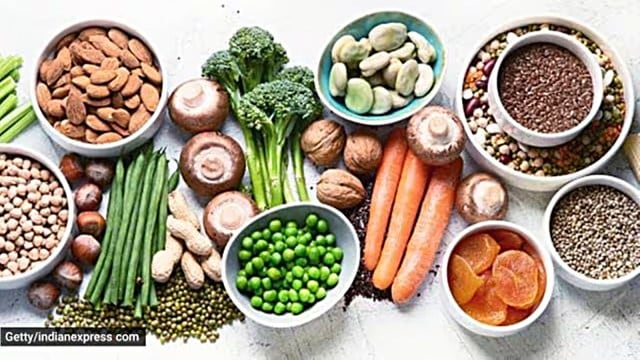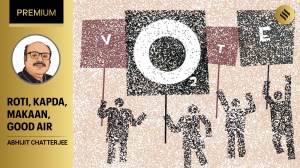- India
- International
Ban on commercial release of GM crops will be against national interest, Centre tells SC
Apex court reserves judgment on PILs challenging govt move for commercial release of GM mustard variant DMH-11
 The government said introduction of GM crops is a policy decision based on expert opinion and trial. (Photo source: Getty Images)
The government said introduction of GM crops is a policy decision based on expert opinion and trial. (Photo source: Getty Images)India already imports and consumes oil derived from genetically modified (GM) crops and “opposition to such technology based on such unfounded fears of adverse impact is only hurting farmers, consumers and industry” and “will be detrimental…for Indian agriculture”, the Centre told the Supreme Court, which reserved its judgment on PILs challenging the government move for commercial release of the GM mustard variant Dhara Mustard Hybrid-11 (DMH-11).
A bench of Justice B V Nagarathna and Justice Sanjay Karol reserved its verdict saying “in our view this cannot be an adversarial issue” but “what is good for the country, good for the people”.
Appearing for the Centre, Solicitor General (SG) Tushar Mehta told the court, “Mustard is the most important edible oil and seed meal crop of India. Approximately 55-60 percent of edible oil in India is imported. Strengthening of plant breeding programmes, including use of new genetic technologies such as GE technology is critical for meeting emerging challenges in Indian agriculture and ensuring food security while reducing foreign dependency”.
The Centre argued that a “ban on commercial/public release of GM crops will be against public and national interest”.
Reeling out statistics, the SG said “the total edible oil demand of India is 24.6 million tonnes (2020-21) with domestic availability of 11.1 million tonnes (2020-21). In 2020-21, 13.45 million tonnes (54%) of our total edible oil demand was met through imports worth Rs 1,15,000 crore, which includes palm oil (57%), soybean oil (22%), sunflower oil (15%), and small quantity of canola quality mustard oil. In 2022-23, 155.33 lakh tonnes (55.76%) of our total edible oil demand was met through import”.

While a total of 272.2 lakh hectares was under cultivation of oilseeds in 2010-11, this increased to 302.3 lakh hectares in 2022-23, he said adding the average per capita oil consumption had also risen from 2.9 kg per year in 1950-1960 to 19.5 kg per year in 2022.
The SG said “India is importing and consuming a large quantity of edible oil from GM oilseeds. India imports about 55,000 MT of canola oil largely from GM canola seeds. Similarly, nearly 2.8 lakh tonnes of soybean oil is being imported annually largely comprising GM soybean oil. Most exporting countries such as Argentina, US, Brazil, and Canada cultivate GM soybean. Globally, around 80 percent of soybean growing is GM soybean”.
Trying to allay fears around the DMH-11 variant, the senior law officer said that “the three genes barnase, barstar, and bar, which are used for developing DMH-11, have history of more than 20 years of safely being in the food chain”.
The SG said the country’s “annual economic losses of crops due to weeds is $11 billion (Rs 1 lakh crore)” and that “annual value of herbicide currently used in India is Rs 4,500 crore even without Herbicide Tolerant (HT) crops”.
He said that “HT crops provide effective weed control” and that “it will be detrimental to ban development of HT crops for Indian agriculture as labour is expensive and not available”.
The government said the DMH-11 hybrid “has shown increased per-hectare yield by 25-30 per cent over the traditional varieties due to exploitation of hybrid vigour”, adding “given that mustard is one of the highest oil-bearing of oilseeds in India, domestic production of edible oils will rise considerably”.
The Centre said that the court will have to decide between the allegations of impact on environment “based upon the study conducted approximately 14 years back and half-backed studies with ad hoc learning of the counsels…” and “competing fundamental right of crores of citizens to get very basic food used in their daily life i.e. edible oil at the prices they can afford”.
It said that “if the trial is successful, subsequent production will have a direct bearing on the dependency on import of this basic food commodity and will have direct and inevitable bearing on the prices at which citizens of this country will be able to procure this food commodity”.
The SG said that “there are certain elements sponsored by those who are importing tonnes of the same edible oil into India and do not want India to be self-sufficient and self-reliant in production of this basic food ingredient used by common man”.
The government said that the petitioner is fully aware that it is impossible to conduct trials in a laboratory. “Any experiment with regard to newly grown crop can only be done in an open field,” it said.
Giving details of the trials, it said, “There are only eight places where this experimentation will be taking place under controlled circumstances and strictly as per the statutory regime already in place. There is no alternative to conducting trials in the open field of approximately 600 square metres per location. Out of the eight such sites of 600 sqmt each, the experiment had already started in six of them and the seeds were sown during rabi season 2022-23.”
The government said introduction of GM crops is a policy decision based on expert opinion and trial. “To safely encourage this endeavour in India, an elaborate statutory scheme exists to ensure effective regulatory review for the research, development, and commercial use of GE technologies,” it said, adding that “petitioners have not pointed out a single flaw on record in the existing statutory regime or its implementation in the trial of DMH-11 till date”.
May 09: Latest News
- 01
- 02
- 03
- 04
- 05






























